Cornelius John, the man who was shot at his home on April 13, has denied that he raped or beat his ex-wife, Joan, three decades ago, or that he chased a neighbour with a cutlass — apparently two decades ago.
Defence counsel Ronald “Ronnie” Marks examined John’s past, citing what he said was an affidavit from the complainant’s divorce, as the trial of Assistant Director of Public Prosecution, Karim Nelson and government Senator Ashelle Morgan continued for a second day, last week Thursday, Nov. 11.
iWitness News had to delay its reportage on the trial after Magistrate Bertie Pompey ordered the media not to report on the evidence during the course of the proceedings.
Today, Thursday, Nov. 18, Nelson and Morgan were acquitted after the court upheld no case submissions by their lawyers.
Nelson was charged that on April 13, at Diamond, he wounded John and that he unlawfully discharged a firearm at him.
Morgan was charged with using threatening language to John on the same date.
Nelson was represented by Counsel Duane Daniel while Marks represents Morgan, who is also a lawyer.
S. Stephen Brette, who is deputy director of public prosecution in St. Lucia, represented the Crown.
The trial is taking place at the Mesopotamia Magistrate’s Court, sitting in Calliaqua.
John was the second witness to take the stand and on Day 2 his cross examination continued, with Marks asking the questions, following Daniel’s cross examination of the virtual complainant the previous day.
John took to the stand at 11:31 a.m., 10 minutes after the court resumed.
Counsel Marks asked John — who owns a concrete products business and a farm — whether he owns a cutlass.
John said yes and the lawyer asked him where the cutlass was on the night of April 13.
“I own about eight cutlass,” John told the court, adding that some of them are on the farm and some at his house.
He told the court that he has employees and Marks asked John if he knows someone named “Skull”, from Diamond.
John said he knows someone named “Hot Skull”.
“So you consider yourself a violent man?” Marks continued.
“No,” John replied.
“Are you in the habit of threatening people with cutlass, attacking with cutlass?” Marks asked, and John, again answered in the negative.
John said that Irene George is his neighbour and they were parties in a court matter before.
“For attacking her with a cutlass?” Marks said.
The prosecutor objected, triggering a round of legal arguments that went from 11:34 a.m. to 12:15 p.m. after which a one-hour break for lunch was announced.
John was recalled to the dock at 1:51 p.m. and was reminded that he was still under oath.
Marks reminded John that in cross examination by defence counsel Daniel, he had said that he is not a violent man but is a Godly man.
John said yes and Marks asked him what had happened between him and George.
‘Why they want to shield this man?’ — defence lawyer
Prosecutor rose and asked who Marks was referring to and noted that the magistrate had said in John’s absence that a witness asked questions about their past misconduct or alleged misconduct is not required to answer.
“So he doesn’t have to answer,” Brette said, adding that he accepted that the court can use its discretion but Marks was going beyond to asking about other convictions.
As the legal argument continued, Marks said, at 1:58 p.m. that if the arguments were going to continue, he would ask that the witness stand down.
Marks said that the case law that prosecutor was referring to was a 1993 case and he Marks was referring to a 2003 law.
The defence counsel further said that he was relying on the law of fairness.
“Why they want to shield this man?” Marks said, adding that he could not be restricted from cross-examining John on his past misconduct or alleged misconduct.
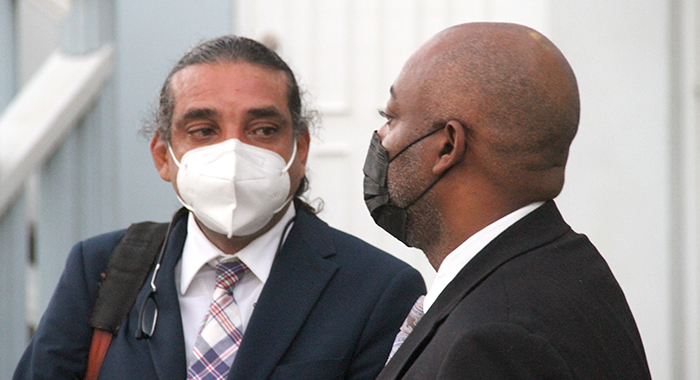
The lawyer said that what he wants the court to rule on is whether John is afforded some protection as a defendant.
“But he is not,” Marks said, adding that the questions the court should ask are the regular questions about evidence: whether it is relevant and probative.
But Brette rose again and said that if Marks was insisting that he could ask John questions about the conviction, the prosecution would like to refer the court to another authority.
However, the magistrate ruled that he would allow the question regarding John’s alleged past conduct, saying that the court has to be fair.
Marks asked what harm was being done by asking John about his past conduct.
“The only benefit is to shield him (John),” Marks said.
The prosecutor cited another authority and told the court:
“We are saying that the character of the witness is not a factor because it is not a domestic violence or divorce proceeding. The principle is that the character of the witness not being itself an issue, such evidence is excluded on the ground of being collateral,” he said and cited a case in support of his argument.
At this point, 2:12 p.m., Marks asked that the witness be excused from the courtroom.
In John’s absence, the defence counsel argued that John’s character is an issue.
“The man is a violent man,” Marks said.
The prosecutor cited another case in support of the Crown’s position.
“You have ruled and we respect the ruling of the court, but for posterity, we want that to be on the record,” Brette said.
The prosecutor further said that to be clear, he would like the court to say whether it was saying that the defence could ask the witness any question about any conduct at any time.
The magistrate said if it is a case of dishonesty, the counsel can ask about dishonesty and if it is about violence, the lawyer can ask about violence.
Ordered to compensate neighbour
John was recalled one minute later and Marks asked him what had happened between him and George.
John told the court that George had threatened his wife, pulling a cutlass at her.
“I was working at Arnos Vale by Ashley Prescott Apartments. When I was on my way home, I met Irene George at the top of the gap, she and a lady named Dionne.”
John said he went down to his yard.
“I had some plantains planted in the back of the yard plus I used to make balusters there — rails and columns. I went to the back and was cleaning my plantains.”
Marks asked John what he was using to clean the plantains and he said a cutlass.
“This is after you pass the woman who pulled a cutlass on your wife,” Marks said and the prosecutor objected.
John continued:
“While I was cleaning the plantains, Irene George run come down from down the road, take up a child she had and run go over to another neighbour yard.
“After she did that, my wife come in the yard and she say to me, I just came from the Calliaqua police station…”
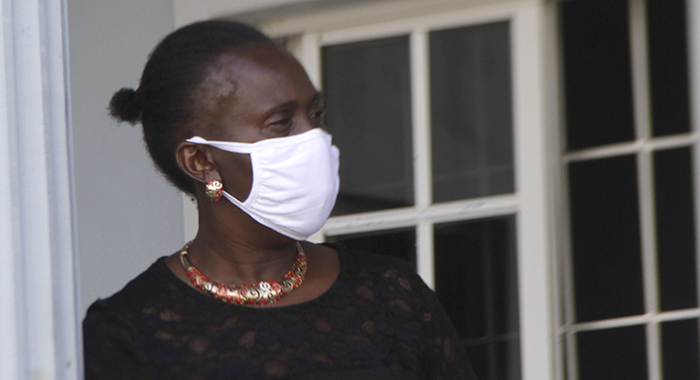
He said his wife further said that she reported to the police that George had threatened her and swung a cutlass over a fence at her.
John said he took up his stuff to go to work the next day and three or four weeks after George came and said he had run her down with a cutlass.
John said that the matter went to court and the case was dismissed. “She didn’t show up in court and the case dismissed.”
A few months later, George sued John for compensation he said, but told the court he could not remember for what exactly.
He said the magistrate ordered him to pay EC$600.
Marks asked John who was George’s lawyer.
“Kay Bacchus,” John said.
Kay Bacchus, now Kay Bacchus-Baptiste, is now John’s lawyer and has a watching brief in the trial of Nelson and Morgan.
Bacchus-Baptiste is scheduled to defend him when he is tried on a charge that on April 13 he used threatening language against Morgan.
Bacchus-Baptiste, who was at the bar table, apparently responding to Marks’ question, said:
“I have long existed. Give it to me. I will take it.”
‘My eyes are blurry…’ — witness
Marks then asked John about his first wife, Joan John.
John told the court that he and Joan were living together for a part of 1993 and later got divorced.
Marks reminded John that he had said that he is not a violent person.
“But you used to beat Joan — your first wife,” Marks said and asked John if during the divorce proceedings, he had sworn an affidavit.
The prosecutor asked whether in SVG this affidavit should have been disclosed.
“You should be disclosing this to me,” Marks responded and passed the document and asked that it be shown to John.
The prosecutor said that the document is an affidavit in a matrimonial proceeding. He further added that it was not disclosed and argued that it should not be put to the witness.
But Marks commented that the document is a public one.
“No, not a public document,” Brette responded, again noting that the document was not disclosed to the prosecution. He said that if it were a criminal proceeding, the document would be a public one.
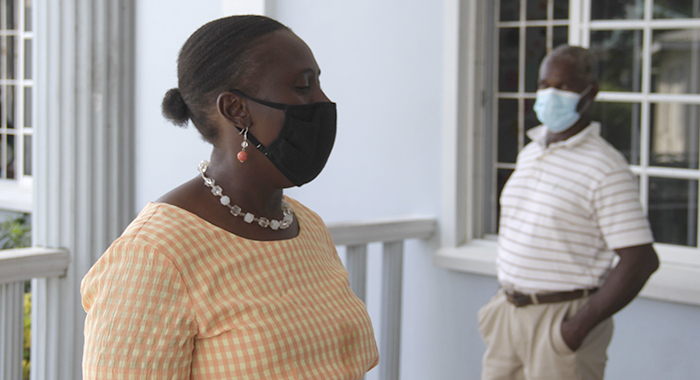
He said it would be unfair to the court, the prosecution and process for the content of the document to be referred to.
“I can only see why they are trying to shield the witness. It is a sworn document,” Marks said.
The magistrate said he would allow the document and the prosecution asked that his objection be noted.
When the document was passed to him, John said he could not see to read it.
“My eyes are blurry and I can’t see to read it.”
He, however, said that it was his signature on the back of the document.
Marks asked that the document be returned to him.
“You said in answer to me that you never used to beat your ex-wife, Joan. This document that you identified as yours—” Marks said.
“The signature,” John responded.
The prosecutor stood up and Marks said he did not understand why the prosecutor was trying to shield John.
“You said you admitted in that affidavit that you used to beat your wife,” Marks told John, and read from the document, “‘I further admit that on some three or four occasions, I struck the petitioner with my hand.’”
“No. I never said that,” John said.
“You didn’t say that but in the divorce, your wife accused you of beating her,” Marks responded.
“No,” John said.
Marks asked him if he knew whether Joan was living in Guyana at some point.
“My ex-wife is a Guyanese,” John said.
Responding to further questions from Marks, John said that his wife was not a seamstress but he was once a snow cone vendor and they have a child named Alaska.
Marks put it to John that his ex-wife, in divorce proceedings, said that he used to beat her. “‘During 1989 the respondent began to beat the petitioner’,” Marks read
The prosecutor rose and said that the court was allowing a 1989 incident to be put to the witness in 2021. “What is the relevance?” Brette said.
“The credibility of the witness. Producing evidence to prove that he does,” Marks said.
The magistrate said that the purpose of credibility is to show that a person is likely to do something.
“Thirty years later?” Bacchus-Baptiste said.
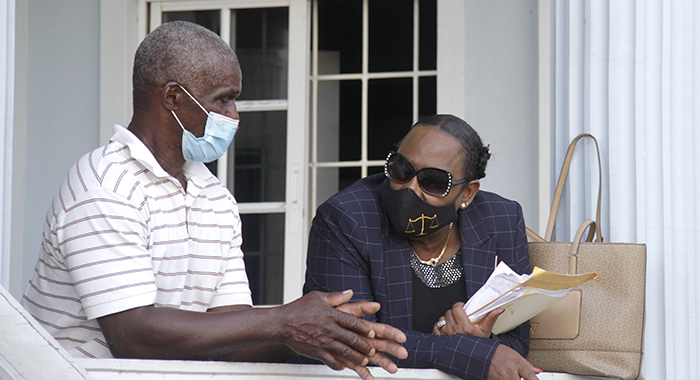
‘Let him answer the question, nah?”
As the cross examination continued, Marks again referred to Hot Skull.
The prosecutor rose and asked that John be excused.
Brette then said that having given evidence from the bar table, Marks had informed the court that the defence is that the witness has a propensity to violence.
The prosecutor said he had no difficulty with that.
“But there must be some limit to that. Counsel cannot cross examine ad infinitum, ad nauseam.
“What is the relevance to an incident in 1989?” he said and pointed the court to a case that indicates that cross-examination is not limited to matters raised in evidence-in-chief but the questions must relate to issues raised in the case.
“He spoke about an incident in 1989. How can that relate to the case?” Brette said.
“If you want to show the history of him beating women, you have to be allowed to prove that,” Marks said.
But the prosecutor said that the allegation is not that John was wounded while beating a woman.
Marks said that “is the genesis of the matter”, adding that as defence counsel he can put to John anything that is relevant to his conduct and propensity.
“The court has tried to explain that to the prosecutor on more than one occasion and the prosecutor is just not listening,” Marks said.
“He (John) cannot be protected. His character is an issue and it will be revealed by evidence. He keeps saying he is not a violent man,” Marks continued.
At this point, the magistrate said that the accused are charged with serious offences and the court has to be mindful that they have a fair trial.
“I will allow the question,” Pompey said.
Brette said that for the record, the prosecution was asking the court to be fair to both sides.
“The prosecution is just trying to shield the man so the court won’t find out what kind of man he is,” Marks said.
John was recalled to the dock at 2:45 p.m.
Marks again referred to what he said was the affidavit from John’s divorce and began to put something to him.
But the prosecutor asked if it was proper for Marks to just read to John what the wife said. Brette further noted the rule of finality.
As the cross-examination continued, Marks put it to John that his wife alleged that he used to beat her.
“I don’t know what she said, but I am telling the truth,” John said.
“But you said that you used to beat she and she throw water on you a time — Joan,” Marks said.
“Me and Joan used to live in Guyana, in Barbados,” John said.
“She used to throw water on you in Barbados?” Marks said, and John responded “Yes.”
“And you beat her?” Marks continued.
“No.”
“And did you say that you had sex with her without her permission two days after she came from the hospital —“Marks was saying when the prosecutor objected and asked about the relevance.
“Your Honour, let him answer the question, nah?” Marks pleaded.
‘Hot Skull’
The objection was sustained and Marks moved on to questions about Hot Skull. John denied going after Hot Skull with a cutlass.
“Hot Skull run my nephew out of a house, break out the windows, kill the dog that he had in the yard, put the dog in the house door, and light the house afire…” John said.
There was some discussion at the bar table about what John said, and Bacchus- Baptiste commented that John had gone on to say what Hut Skull did.
The prosecutor sought the guidance of the court about what the witness had said and there was some cross talk at the bar table.
John began to repeat his answer and Bacchus-Baptiste said.
“Take your time.”
“With stones,” John said, and Marks asked him if he was there.
“No,” John responded.
The prosecutor said that if Marks chose to ask a question John should be allowed to answer, but Marks said that he had not asked John “that question”.
The magistrate advised John to tell the court only about what he saw, heard, and smelled — “anything that you witnessed”.
Marks put it to John that Hot Skull used to work for him.
“Before he did what he did,” John said, but denied confronting Hot Skull. “I went to the police. I did not confront him.”
“And you did not run him down with a cutlass?” Marks said.
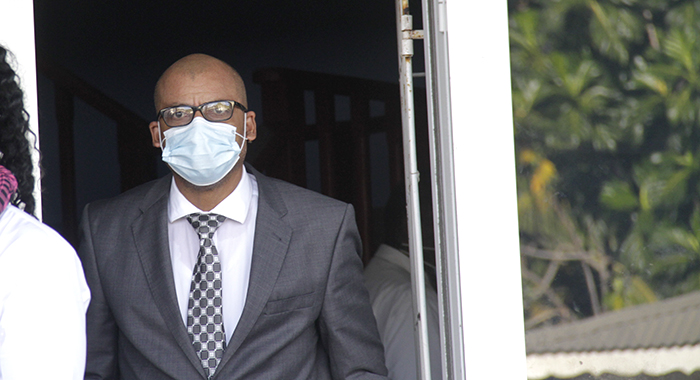
At this point, the prosecutor rose, leading to a heated exchange between him and Marks.
After the heated exchange, Marks said that he would like to have John look again at the document, the signature of which he identified.
The prosecutor complained that he did not have a copy of the document.
“Where’s my copy?” Brette said, adding that he wanted the record to show that there is no way he would produce a document in the court and not show it to the defence.
“If I don’t, the court will order him to produce a copy. I produced a case law, I walked with four copies,” Brette said.
Marks continued with his cross examination, and noted to John that on the previous day, Wednesday, when Counsel Daniel asked him if he was verbally abusive to his wife on April 13, he (John) had said he did not know what his wife would consider to be verbally abusive.
Marks said he would read some words and ask John to say whether he thought they were verbally abusive.
The magistrate, however, interrupted the lawyer and asked him what document he was reading from.
The prosecutor also rose and objected.
The magistrate said Marks did not say what the document was and the prosecutor noted that Marks had said that the document is a statement by John’s current wife, Nicole John.
Brette asked how counsel could put a document to the court when it had not been proven that the words were Mrs. John’s.
The magistrate allowed the question.
John said he did not use threatening language to his wife on April 13.
“Did you say, ‘You want me get a machine gun and kill you, your grandchildren and children?’” Marks said that the prosecution said that that question had been asked and answered.
The magistrate agreed that that was the case, but said that it was Counsel Daniel, and not Marks who had asked the question previously.
However, Brette said that his objection is based on the principle of finality. He said that John had said that he had not used any threatening words.
The prosecutor said that the defence could not then put to John particularised, alleged threatening words.
Marks asked John if he told his wife on April 13 “Ah go chop off your neck, ff your head, sacrifice your blood to the devil along with the children.”
John said no.
‘How can he go into the mind of that person?— Prosecutor
Regarding what occurred on the night of April 13, John, responding to Marks’ questions, told the court that his wife came home in Morgan’s car and went into the house in which she (Mrs. John) lived.
“The following day, your wife made a report about your threatening language—” Marks said.
The prosecutor objected, saying the question was cause for speculation as John would not know whether his wife had done that.
The magistrate said he would allow Marks to complete the question.
Brette, however, said that John was not asked, “Do you know?”
Marks began telling John, “You had any knowledge of that—” and the prosecutor again objected
The magistrate asked John if he knew whether his wife had made a report to the police alleging that he had used threatening language to her.
John said he learnt of this when he came out of the hospital.
Marks asked John if he was charged with using threatening language to his wife and got a charge sheet to attend court.
John said he was summoned to attend court but not on that matter.
“Which matter?” the prosecutor said.
“The only matter I asked him about. I don’t know what other matter he has,” Marks said.
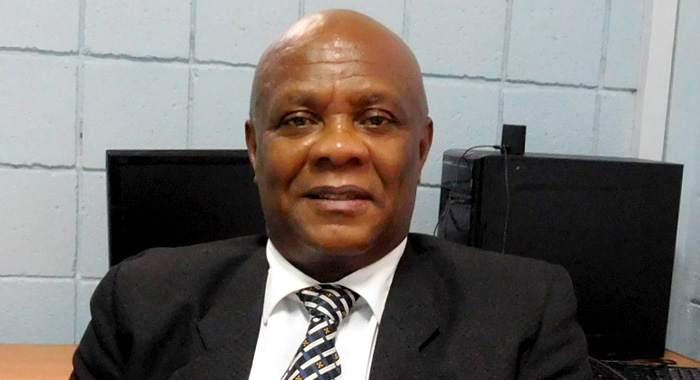
Marks put it to John that when Morgan and the two other people came to his house on April 13, that John approached them in a very aggressive manner.
John denied this and also answered in the negative to a question that he used some word to Morgan.
“So the words that you used that night, you used just generally to the three persons who came in there? That is your evidence” Marks asked.
“Yes.”
The lawyer asked John if he had any explanation as to why the people who came to his house were telling him to relax.
The prosecutor objected, saying that was cause for speculation. “How can he know why somebody told him something? How can he go into the mind of that person?”
“But you weren’t doing anything? When he told you, ‘Relax’? What were you doing?” Marks continued.
John said that he felt that the third person was advancing as if he was going to grab his mouth so he (John) stood up.
“The man pushed me down and say, ‘Relax.’”
Marks pointed out to John that he had not said that in any police station.
“You just asked me how I felt,” John responded.
John sat down again when the man told him to relax and after that, the tall man ran over and kicked him so hard that he fell off the block.
“’Till now my side is hurting me now,” he said and told the lawyer that the man stomped him in his belly.
“And I had belly pain for how much days and the nurse had to give me injection in my belly for belly pain. And I believe my lung is damage.”
Marks put it to John that he never received any kick from the man.
“I did receive many kicks and stomps,” John said.
The lawyer further put it to John that all the evidence about having pain and injury because of the kicks is a lie.
“You received no such injury,” Marks said.
“The doctors report what they did to me. I received many kicks and stomps. I received injuries at my side and at my bottom belly; at the time I had pain.”
Marks stopped John and told him not to give medical evidence.
“We have the medical evidence. You have answered my question.”
The lawyer suggested to John that on the night of April 13, he was armed with one of his eight cutlasses.
“False. Not true,” John said, and further told the court that Marks’ suggestion that he lunged at the three people with the cutlass was a “Wrong suggestion. That’s not true.”
He also said that it was “false” that he was shot after running out to the three people with a cutlass.
Marks suggested that John had used to dispose of the cutlass, the five minutes which he said the auxiliary officer took to arrive after the shooting.
“During that time, I could not move. My foot and them was cramped up. Blood was spurting out,” John said.
Marks said there was an open window next to John in the pictures that had been presented to the court.
Bacchus-Baptiste in a muted comment asked if the pictures were of that night.
Daniel reminded her she had a watching brief.
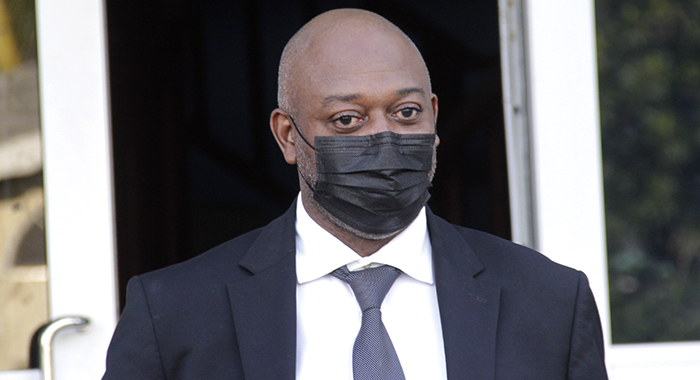
‘People accuse people of things they never did’ — John
In relation to the incident for which John has a conviction, Marks asked him whether the magistrate had asked him if he was guilty or not guilty.
The prosecution rose and said that that is hearsay. He said that hearsay is anything said out of court that he wants to say is true or not.
Marks said that the witness has a conviction that is accepted by the court.
“All I want him to say is whether he was convicted or pleaded guilty.”
The prosecution said that Marks could ask that question and the defence counsel agreed.
“Did you plead guilty … or you were convicted,” Marks asked John, who responded, “Which one?”
“With your first wife,” Marks said and John responded that he could not recall hearing about a conviction.
“I don’t know anything about them conviction,” John said.
“But you had to pay a fine,” Marks said and John asked “For what?”
Marks said that John had unlawfully and maliciously wounded his first wife on March 23, 1993.
The prosecutor objected, saying that all defendants are innocent until proven guilty and whether John pleaded guilty or was found guilty, he was exercising his constitutional right.
Marks said that the question went precisely to what the prosecution was saying and he agreed wholeheartedly.
“If someone pleads guilty and yet says they don’t beat women it is a different thing.”
Marks put it to John that he pleaded guilty.
The prosecution pointed out that John had said that he could not recall.
Asked if he had broken his first wife’s finger, John said he never broke “anything for her”.
Marks put it to John that that was part of the divorce proceedings.
John said that the divorce “was over money, bad spending my money. And she said she never loved me.”
But Marks put it to John that the divorce was not about money but domestic violence.
“If I work for $75,000 and when I look for the money I can’t find it, I am the one being abused,” John said.
Marks told John that his ex-wife had said that he broke her finger.
“People accuse people of things they never did,” John said and Daniel and Marks said, “Very true.”
Marks put it to John that he was bonded for allegedly breaking his wife’s finger and John said he cannot recall that.
But the prosecution asked the court what was the benefit of testing John’s memory when the document is on the record.
Marks said it was totally up to the court to determine whether the defendant would remember breaking his wife’s finger years ago.
Marks said that he has documents proving that John was convicted.
The cross examination ended at 3:29 p.m. and the prosecution declined re-examination.
The next witness was Rochelle Franklyn, an auxiliary police officer and John’s neighbour, who responded to the shooting.




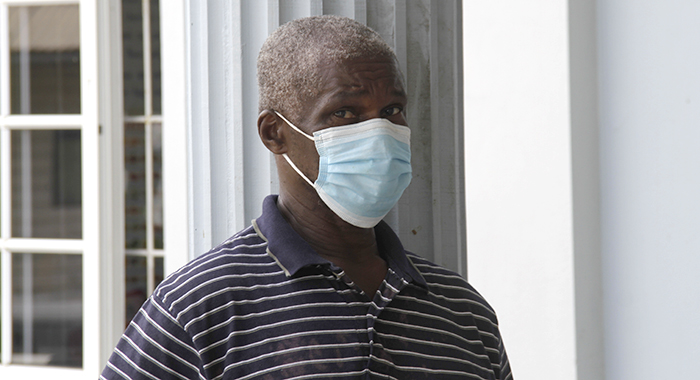


All this sounds like a rigmarole story. He say she say and they say. What a comedy show in saint Vincent.
All I want to see is Women Empowerment.
It’s time men stop treating women like slaves.
This trial mimics the novel Animal Farm. The lawyers and the accused are all components of that kingdom. They all acted in concert the accused but were never charged with criminal trespass. The legal cacophony coming from individuals who are supposed to be scholars but are a bunch of cockscombs.
Fuccin wicked government!!!!
What is so hard to see, 3 people went to a man place rough him up and shot him, to me this do not need a trial, but sentenced the culprit, it is as simple as that instead of wasting taxpayers MONEY, as long as the man is there there will NEVER be any JUSTICE in svg because he controls everything but I would like to remind. Him that TIME IS LONGER THAN ROPE
It seems as if John is completely innocent here so they are looking for something in his past to turn him into the accused and the accused to somehow become “knights in shining armour”.
In this case is it also allowed to research into the past of the originally accused and use that as evidence? If all this is allowed, the case may last years, depending on each of their pasts and how deep into the past investigators go. Is it possible that one of the accused, when at age five, may have pointed a carrot in the face of another child and threatened to throw mud on her dress if she mentioned she was in love with Jimmy Smith?
It reminds me of the case against Star Garage. If our judges continue to allow “outside evidence” that has little to do with the actual case to taint the purpose of the trial, our justice system is in big trouble! No wonder we have such a backlog.
If someone did something “not nice” in the past it makes them therefore guilty in the case at hand; Somehow I see a problem there.
After reading this we see that there is a lawyer here, just like the lawyer in the Star Garage case, that, in my opinion, should not be allowed to practice law in SVG based on their behavior in court. If I were in the jury, seeing a lawyer acting in this way would make me lose confidence in anything that comes out of that lawyer’s mouth.
The lawyer in the Star Garage case prevailed because the opposing lawyer seemed incompetent.
Beverly, there was no jury, this was purposely held in the magistrates court, a lower court, the offences were serious and it should have been held before a judge and jury. This was the very first indicator of what path was to be taken in this matter.
The problem is everyone involved in the case from the accused to the judiciary are in some way linked to the ULP government. I feel sure everyone knew what the final outcome would be, I never doubted for a moment that there would be an acquittal.
I believe the prosecution attorney was ill chosen. One should have been used from some further afield part of the commonwealth, not Saint Lucia. Not someone with the same position in a government appointed position as one of the accused. Even if the man is as straight as an arrow, the choice brings doubts to the minds of the people.
Sorry but justice has not been seen to be done, in fact exactly the opposite.
So what this has to do with people trespassing in the man yard and insulting him? A bunch of wicked evil hypocrites. Hope you all can speak to God for them when the time comes, even though you set them free, the people still sees them as criminals in wig and jacket and tie.
Whatever Mr John did in the past, if any part of that is true, it does not warrant three vigilantes bypassing the justice system and applying a punishment by shooting him. John could have bled to death, the seriousness of this matter is really untold. But we should look at the politicians who are involved in this matter and get them out of power. Nothing presented against him can legalise people to trespass on his private property. to come unannounced, to beat him and shoot him, to put his life at risk in what could potentially have been a murder charge against them.
See how quiet the politicians are now, because they fear the wrath of the citizens in this absolute unprincipled outcome.
I suppose if our leaders are able to permantly able to dodge rape and sexual assault charges, not allegations, actual charges, what else can we expect but for the filth to overflow into every aspect of our judicial system.